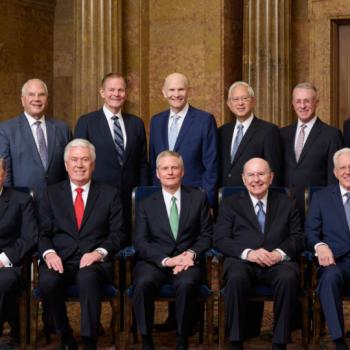
A view from above of the Holodomor Memorial in Kyiv, commemorating Stalin’s murder of millions of Ukrainians by means of the deliberately-imposed “Ukrainian Terror-Famine”
(Wikimedia Commons public domain image)

***
“Ukrainian prayers of faith: Watch CNN footage of citizens praying in public square”
Over the past couple of days, I’ve posted blog entries here that, among other things, have alluded to religious dimensions of the struggle between Russia and Ukraine. I’m grateful to certain readers of this blog for calling my attention to a precedent for what Latter-day Saints, in particular, might expect if the Russians gain complete control over Ukraine. Here are a couple of older stories (from December 2021) about what was done to a Latter-day Saint chapel in Donetsk:
“In occupied Donetsk, seized Mormon church turned into “Russian House””
Imagine the glorious uses to which Russia might be able to put the Kyiv Ukraine Temple!
Meanwhile, here’s an article from 2019 that might help to put the current Russian invasion into its proper context:
“Stalin’s Approval Rating Among Russians Hits Record High – Poll”
My dear friend Professor Louis Midgley, who taught Tocqueville’s classic Democracy in America (1835, 1840) for many years at Brigham Young University, shared the following in the comments section to my blog, and I think it deserves more prominence here:
The final five paragraphs of Alexis de Tocqueville’s first volume of Democracy in America, Mansfield and Winthrop translation (University of Chicago Press), on pages 395-6, read as follows :
There are two great peoples on the earth today who, starting from different points, seem to advance toward the same goal: these are the Russians and the Anglo-Americans.
Both have grown larger in obscurity; and while men’s regards were occupied elsewhere, they have suddenly taken their place in the first rank of nations, and the world has learned of their birth and of their greatness almost at the same time.
All other peoples appear to have nearly reached the limits that nature has drawn and to have nothing more to do than preserve themselves; but these are growing; all others have halted or advance only with a thousand efforts; these alone march ahead at an easy and rapid pace on a course whose bounds the eye cannot see.
The American struggles with the obstacles that nature opposes to him; the Russian grapples with men. The one combats the wilderness and barbarism, the other, civilization vested with all its arms: thus the conquests of the American are made with the plowshare of the laborer, those of the Russian, with the sword and the soldier.
To attain his goal, the first relies on personal interest and allows the force and the reason of individuals to act, without directing them.
The second in a way concentrates all the power of society in one man.
The one has freedom for his principal means of action; the other servitude.
Their point of departure is different, their ways are diverse; nonetheless, each of them seems called by a secret design of Providence to hold the destinies of half of the world in its hand one day.











